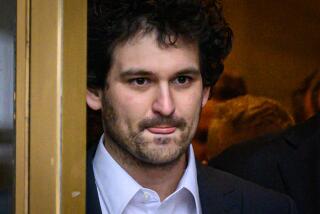Financiers Relieved at Court’s Decision
- Share via
SAN FRANCISCO — Silicon Valley financiers expressed relief Friday when a federal judge in New York declared a mistrial in the obstruction-of-justice case against Frank Quattrone, the former Credit Suisse First Boston investment banker who rose to fame by orchestrating some of the biggest initial public stock offerings of the dot-com era.
“I am personally thrilled for Frank,” said Richard Kramlich, founder of New Enterprise Associates, a venture capital firm in Menlo Park. “I thought the case was weak.”
For many in the valley, Quattrone’s prosecution on charges that he tried to block a government investigation of his firm’s handling of hot IPOs was seen as a referendum on the business practices behind the tech bubble of the late 1990s.
“The people were looking for a scapegoat after having lost money on the stock market, and he was the high-profile guy they hoped to nail,” said Tim Draper, managing director of Redwood City venture capital firm Draper Fisher Jurvetson. “Let’s get the fear behind us, and let real businesspeople -- Frank included -- do their jobs.”
Sandy Robertson, founder of now-defunct San Francisco investment banking power Robertson Stephens Inc., agreed that Quattrone was taking the blame for investors who paid exorbitant prices for shares of new, unprofitable companies.
“Frank wasn’t stealing money,” he said. “It was the market that got out of hand.”
Even those who believe in the need to reform some Silicon Valley practices -- such as the handing out of valuable IPO shares to friends and business associates -- said Quattrone wasn’t any more guilty than others.
“It isn’t Frank Quattrone who should be on trial, but the whole system,” said William Hambrecht, a founder of San Francisco investment banks Hambrecht & Quist and WR Hambrecht & Co. “The current system creates a guaranteed profit, and anytime there is a guaranteed profit, people will bid for it.”
Yet most disappointed by the mistrial were those who hoped the case would prompt a reexamination of financial conflicts of interest, including the interlocking business relationships that are commonplace in the valley.
“He may have been the best example of some practices which need to be abolished and made a part of Silicon Valley’s past,” said Kirk Hanson, executive director of the Markkula Center for Applied Ethics at Santa Clara University. “If the mistrial is the final word in the saga of Credit Suisse First Boston and Frank Quattrone, there is a danger that some Silicon Valley players and observers will believe that we can go back to business as usual.”
Quattrone’s prosecution and other civil actions against the investment banks have brought some change, Hanson and others said. Exactly how much is hard to gauge because the IPO market has cooled significantly in the last two years.
“By the time we hit another IPO market like [the late ‘90s], there are going to be in place procedures within the firms that make the ‘Friends of Frank’ phenomenon impossible,” said Stanford University law professor and IPO expert Ron Gilson.
The Friends of Frank were those scores of executives who received coveted IPO shares, which essentially were free money during the boom years.
Those immortalized in court documents and news articles as FOFs have been embarrassed by the media’s depiction of them as greedy insiders. Not surprisingly, some were reluctant to defend their benefactor publicly.
“I really don’t know Quattrone,” said Stephen Dukker, a former chief executive of EMachines Inc. who was identified as an IPO stock recipient and FOF. “I don’t have a comment.”
Another ex-CEO -- and evidently ex-FOF -- didn’t even want his name be attached to his reason for not commenting.
“I don’t need to highlight myself and my family,” he said. “An opportunity was made available to me, and I took it.”
More to Read
Inside the business of entertainment
The Wide Shot brings you news, analysis and insights on everything from streaming wars to production — and what it all means for the future.
You may occasionally receive promotional content from the Los Angeles Times.










